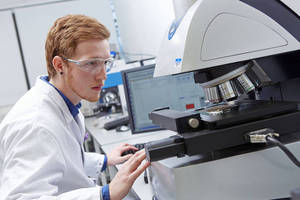Viewing the Evidence. RSSL Uses the Morphologi G3 to Troubleshoot Particle Sizing Methods
Share:

Malvern, UK –Â Scientists at Reading Scientific Services Ltd (Reading, UK), which provides analysis, research, consultancy and training services for the food, pharmaceutical and healthcare industries, are using a Morphologi G3 automated particle imaging system from Malvern Instruments to troubleshoot particle sizing methods for pharmaceutical clients and develop fully validated procedures.
The Morphologi G3 delivers statistically relevant particle size and shape data that enable the investigation of factors that can have an effect on particle size measurement, such as dispersion state and crystal shape. Running automated particle imaging alongside laser diffraction particle sizing using the Mastersizer 2000 supports the development of truly robust test methods that may be applied to characterize products from developmental through to commercial scale manufacture.
“RSSL develops particle size analysis methods for pharmaceutical clients that are fully validated in line with regulatory requirements,” explains Chris Aiken, Physical Sciences Laboratory Manager, RSSL. “To do this we need to ensure that the method we provide gives tight control over any source of potential variability. Sometimes particle shape measurements may be used to troubleshoot suspected dispersion issues that can be encountered during laser diffraction measurement. In a recent project, for example, the images from the Morphologi G3 provided compelling evidence that the particles, rather than the sizing method, were a root cause of observed variability. Here the imaging results helped us to modify the existing particle sizing method so that it would work successfully for the commercially manufactured product.”
In a recent study, a pharmaceutical manufacturer approached RSSL with a size measurement issue that had arisen following scale-up of the process to commercial manufacture of an active pharmaceutical ingredient (API). Automated image analysis demonstrated that in the small/pilot scale manufacturing process, API crystal shape was consistent. However, during commercial API manufacturing processes either cubic or rod-shaped crystals were produced. Consequently, variability was observed in the particle size results returned by the laser diffraction measurement method for the commercial scale batch. By intelligently modifying the laser diffraction method to tackle the issue, RSSL delivered an appropriate, fully validated technique for monitoring the manufacturing process.
Laser diffraction is a fast and efficient technique used routinely across the pharmaceutical industry for particle sizing. Sample preparation for laser diffraction is often rapid but appropriate dispersion of the test sample is essential in order to obtain meaningful results. As with many other sizing techniques, including sieving and sedimentation, laser diffraction results can be influenced by particle shape. Using automated imaging alongside laser diffraction is an efficient way of detecting problems with dispersion since it allows multi-particle agglomerates to be visually distinguished from primary, dispersed particles. A change in shape resulting from a change in feed source or process scale-up may also be efficiently detected.
Find out more about the Morphologi G3 at http://www.malvern.com/morphologi
To learn about the services provided by RSSL go to www.rssl.com
Malvern, Malvern Instruments, and Morphologi are registered trademarks of Malvern Instruments Ltd
About Malvern Instruments
Malvern provides the materials and biophysical characterization technology and expertise that enables scientists and engineers to understand and control the properties of dispersed systems. These systems range from proteins and polymers in solution, particle and nanoparticle suspensions and emulsions, through to sprays and aerosols, industrial bulk powders and high concentration slurries. Used at all stages of research, development and manufacturing, Malvern’s materials characterization instruments provide critical information that helps accelerate research and product development, enhance and maintain product quality and optimize process efficiency.
Our products reflect Malvern’s drive to exploit the latest technological innovations and our commitment to maximizing the potential of established techniques. They are used by both industry and academia, in sectors ranging from pharmaceuticals and biopharmaceuticals to bulk chemicals, cement, plastics and polymers, energy and the environment.
Malvern systems are used to measure particle size, particle shape, zeta potential, protein charge, molecular weight, mass, size and conformation, rheological properties and for chemical identification, advancing the understanding of dispersed systems across many different industries and applications.
Headquartered in Malvern, UK, Malvern Instruments has subsidiary organizations in all major European markets, North America, China, Japan and Korea, a joint venture in India, a global distributor network and applications laboratories around the world. www.malvern.com.
For press information, please contact:
Trish Appleton
Kapler Communications
Phoenix House, Phoenix Park
Eaton Socon, Cambridgeshire, PE19
8EP, UK
Tel: +44 (0)1480 471059
Fax: +44 (0)1480 471069
trish.appleton@kapleronline.com
USA contact:
Marisa Fraser
Malvern Instruments Inc.
117 Flanders Road
Westborough, MA 01581-1042 USA
Tel: +1 508 768 6400
Fax: +1 508 768 6403
marisa.fraser@malvern.com
Please send sales enquiries to:
Alison Vines
Malvern Instruments Ltd
Enigma Business Park
Grovewood Road
Malvern, Worcestershire
WR14 1XZ UK
Tel: +44 (0) 1684 892456
Fax: +44 (0) 1684 892789
salesinfo@malvern.com
www.malvern.com




